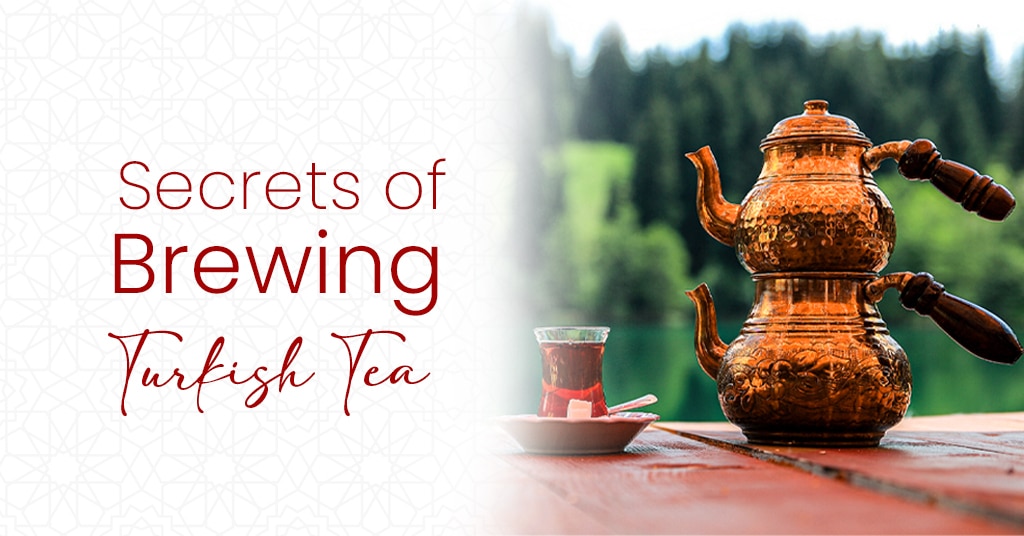
Turkish tea is more than just a beverage, it is a symbol of Turkish culture, unity and warm conversations. In the Turkish tradition, tea takes place as an indispensable part of shared memories, deep conversations and daily life.
Turkish tea is best brewed in a teapot. The teapot, split into two different containers, the one on the top holds the brewed the tea and hot water on the bottom. Thus, brewing time and the amount of water could be adjusted, so the the taste of the tea can be determined according to personal preferences. So, what ingredients should we use to make Turkish tea and what should we pay attention to when preparing this tea?
The Necessary Ingredients for Brewing Turkish Tea
The Teapot: The Heart of the Brew
The teapot is one of the most critical stages of brewing Turkish tea. High-quality stainless steel or ceramic teapots distribute the heat evenly, allowing tea to be brewed in a more balanced way.
Quality Turkish Tea: The Key to the Taste
The quality of the tea directly affects the taste of the tea you brew. Using quality Turkish tea makes a difference with every sip.
Water: The Keystone of the Tea
The quality of the water you use when brewing tea is also very important. Make sure to use purified or spring water.
Cups: The Elegance of Presentation
Turkish tea is usually served in a tea cup. These cups make you feel the aroma of the tea better and reveal the color of the tea.
The Secrets of Brewing Tea
In Turkish culture, tea has gone beyond from just being a drink and has become a symbol of traditions, sharing and sweet conversations. Knowing the subtleties behind a cup of tea and the right techniques, takes this enjoyable experience to the next level. Here are some tips you should pay attention to when brewing Turkish tea:
Quality Tea and the Right Storage Conditions: The Keystones of a Good Tea
There is as much art as science behind brewing tea. However, the first and most important step of this art is to use high-quality tea leaves. Remember, no matter how good the result of brewing tea is, if you initially start with a poor-quality product, the result will also be as poor. Quality tea leaves offer a rich, layered aroma and taste experience when brewed.
The quality of the tea is not limited only to its condition at the time of purchase; it is also of great importance how it is stored. Tea leaves are very sensitive to external factors such as humidity, heat and air. These factors can negatively affect the aroma, color and overall quality of tea. Therefore, it is ideal to store your tea in airtight glass containers and away from moisture. Also, you should keep these containers in a cool, dark place to protect your tea from excessive heat and direct sunlight.
If you are not going to consume your tea quickly, buying it in packages that match your consumption habits can also be a very smart strategy. In this way, you will preserve the freshness of your tea.
Choosing a Teapot: The Hidden Factor That Affects the Quality of Your Tea
Brewing tea is not only a preparation of a drink for many people, but also a ritual. In this ritual, the teapot has a decisive role on the quality of tea. However, the choice of a teapot is not only about aesthetics or functionality; the effect of the teapot on the aroma and taste of tea should not be ignored.
Tea leaves can easily attract the smell and aroma of the container in which they are brewed. If you also use your teapot for different herbal teas, the teapot will eventually take up these aromas and will pass them to your tea. This can spoil the original aroma and taste of your tea. For example, if you are boiling linden in your teapot, this unique aroma will also pass into your tea and mask the unique taste of the tea. To prevent such transfer of odors and aromas, you can use a special teapot for brewing tea.
Water Quality: The Factor That Determines the Taste of Your Tea
If we accept that tea brewing is an art, water is one of the main materials of this work of art. Water quality directly affects the aroma, color and, most importantly, the taste of the tea.
Tap water often contains chlorine and other chemical substances. These substances can negatively affect the taste of your tea, and may even be harmful to your health. Chlorine can mask the natural aroma of tea, and lime can lead to health problems over time. That’s why we recommend using filtered water or drinking water instead of tap water when brewing tea.
It is also important to wait for the water to reach the boiling point. Insufficiently boiled water cannot open the tea leaves all the way, which negatively affects the taste of tea. But remember, it can also be useful to wait for the water to cool down a little after boiling; excessively hot water can burn tea leaves and create a bitter taste.
Using Fresh Water: Add Vitality to Your Tea
The freshness of the water is often overlooked when brewing tea, but this is one of the critical factors that determines the quality of your tea. The water that has been kept waiting or previously boiled and cooled, it’s oxygen level may have been decreased and the minerals may have lost their effect. This is a condition that can negatively affect the aroma and taste of your tea.
Also, boiling the same water over and over again can change the structure of the water and negatively affect the flavor of your tea. If you are boiling water to brew tea, try to boil exactly the amount of water you need. This will help you maintain the freshness of the water and ensure that your tea is always brewed in the best way.
Temperature Control: Control the Brewing Process of Your Tea
Brewing tea requires precise temperature control. Tea leaves need to be brewed at a certain temperature and for a certain period of time so that they can release all the aromatic and flavor components into the water. After brewing your tea, place the teapot on top of the teapot and let it brew for 15-20 minutes over medium heat. Keeping the temperature of the fire constant during this time is critical to maintaining the flavor of the tea.
Increasing the heat can lead to excessive brewing of tea leaves and, as a result, a bitter taste. On the other hand, lowering the heat too much can also cause the tea not to brew enough and the aroma of the tea to decrease. Keeping the heat constant allows the tea to release all the flavor and aroma components into the water in a balanced way.
The brewing time of the tea is also an important factor. brewing for more than 20 minutes can cause the taste of tea to deteriorate. In order to find out that your tea has been brewed enough, you can open the lid of the teapot and check whether the tea leaves have collapsed to the bottom. If they are at the bottom, then your tea is ready.
Take Your Turkish Tea Experience to the Top with Turkish Ali Bazaar!
Discovering the brewing secrets of Turkish tea is like tasting a thousand-year-old tradition in a glass. With quality tea leaves, the right water and a carefully selected teapot, you can also prepare the most beautiful Turkish tea at home.
On our website, not only quality tea varieties, but also special design tea cups that will complement your tea brewing experience and teapots can also be found. These special equipment that you will use while preparing your tea will turn every brewing moment into a ritual.
At the same time, you can complement your tea with the sweet flavors of Turkish cuisine. Baklava, Turkish Delight, halva and other Turkish sweets as such will offer a sweet pleasure with your tea. You can sweeten your memories with a glass of Turkish tea and delicious Turkish sweets next to it. As the Turkish Ali Bazaar family, we are here to make your Turkish tea experience special with our carefully selected and prepared products.











 Home
Home  Whishlist
Whishlist  Compare
Compare  Checkout
Checkout